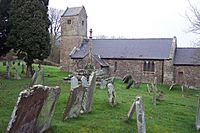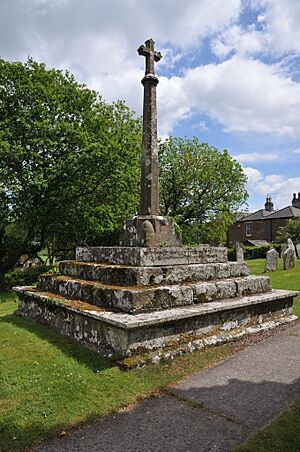Church of St Thomas à Becket, Wolvesnewton facts for kids
Quick facts for kids Church of St Thomas à Becket, Monmouthshire |
|
|---|---|
| Church of St Thomas à Becket | |

The church with the war memorial cross in the centre
|
|
| Lua error in Module:Location_map at line 420: attempt to index field 'wikibase' (a nil value). | |
| Location | Wolvesnewton, Monmouthshire |
| Country | Wales |
| Denomination | Church in Wales |
| History | |
| Status | Parish church |
| Founded | c.13th century |
| Architecture | |
| Functional status | Active |
| Heritage designation | Grade II* |
| Designated | 19 August 1955 |
| Architectural type | Church |
| Administration | |
| Parish | Wolvesnewton |
| Deanery | Raglan/Usk |
| Archdeaconry | Monmouth |
| Diocese | Monmouth |
The Church of Saint Thomas à Becket is a very old church in Wolvesnewton, Monmouthshire, Wales. It was first built around the 13th century. The church was fixed up in the 1800s and is still used today. It is a special building called a Grade II* listed building. This means it is very important and protected. The old cross in the churchyard is also special. It was made in the Middle Ages and later became a memorial for soldiers from the First World War. It also has its own Grade II* listing.
The Church's History
The first time this church was written about was in 1254. The window on the west side of the tower is from this early time. The church was rebuilt and made better between 1855 and 1857. An architect named John Norton led this work. The church is still an active parish church today. It is part of the Raglan-Usk area.
What the Church Looks Like
The church is built from blocks of Old red sandstone. Its roof is made of Welsh slate. The whole building is a Grade II* listed building. This means it is a very important historical place.
Inside, the church is simple and has white walls. Most of the decorations you see are from the Victorian era. People have different ideas about John Norton's work in the 1800s. Some, like history expert John Newman, thought it was a "drastic" change. Others, like the group Cadw, felt it was a "sensitive restoration." This means they thought he fixed it up carefully.
The church also has some beautiful stained glass windows from the 1900s. John Newman thinks these windows remember people who died in World War II. Cadw also mentions this idea. However, another group, the University of Wales Centre for Advanced Welsh and Celtic Studies, thinks the windows remember someone from the Hood family of Tredean House, Devauden. Everyone agrees that the windows were made by the company of Thomas W. Camm. His daughter, Florence, did most of the work.
The Old Cross Outside
In the churchyard, there is an old cross. It was probably made in the 1400s, during the Middle Ages. Around 1920, this cross was rebuilt. It became a special memorial for local people who died in the First World War. The bottom part and the very top of the cross are from the 1900s. But the tall middle part and two of the steps are from medieval times. The cross is made of limestone. It is also a Grade II* listed building, just like the church.
 | James Van Der Zee |
 | Alma Thomas |
 | Ellis Wilson |
 | Margaret Taylor-Burroughs |


